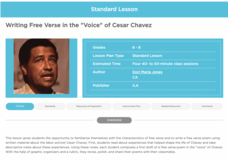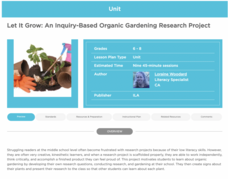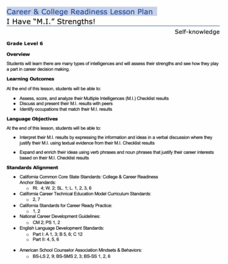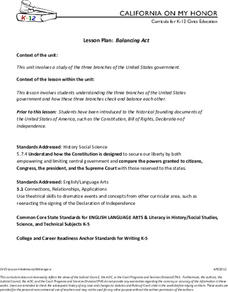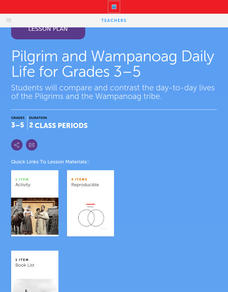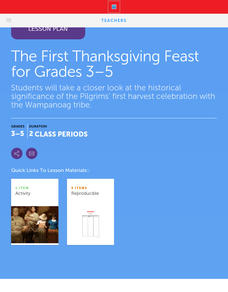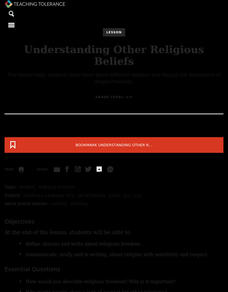ReadWriteThink
Writing Free Verse in the "Voice" of Cesar Chavez
Introduce middle schoolers to free verse poetry with a lesson that has young poets read two free verse poems and list the common characteristics of the form. They then read a passage from Cesar Chavez's biography and a free verse poem...
ReadWriteThink
Persuasive Essay: Environmental Issues
Young environmentalists learn how to craft a persuasive essay about an environmental issue they consider important. After studying the components of a persuasive essay and examining a student model, writers brainstorm possible topics and...
ReadWriteThink
Let It Grow: An Inquiry-Based Organic Gardening Research Project
How does your garden grow? An inquiry-based, organic gardening unit asks young scientists to research a vegetable or flower, create an environment for it, and then plant and tend to the seedling. Gardeners develop their own research...
National Endowment for the Humanities
García Márquez’s Nobel Prize Speech: “The Solitude of Latin America”
To conclude a study of One Hundred Years of Solitude, class members analyze Gabriel Garcia Marquez's Nobel Prize in Literature acceptance speech. After a whole-class discussion of the main ideas in the speech, individuals draft a...
Learning for Justice
Marian Wright Edelman
Marian Wright Edelman's 2014 Commencement Speech at Lewis and Clark College serves to inspire young scholars to investigate a problem in their community, to determine why the problem is important, and then to develop a plan for one thing...
Learning for Justice
Mary McLeod Bethune
Young historians conduct a close reading of the text of an interview with Mary McLeod Bethune, the daughter of former slaves who taught herself to read, grew up to establish schools for other Black women, and went on to become an advisor...
Learning for Justice
Mary Church Terrell
Excerpts from an 1898 speech by civil rights activist Mary Church Terrell offers young scholars an opportunity to investigate how Black American women fought for civil rights long before Rosa Parks and the civil rights movement of the...
Newseum
Reporting Part III: Staying Objective
The third and final instructional activity in the Reporting series tests young journalists' ability to be objective in reporting contentious topics. After brainstorming a list of contentious topics that interest them, the class selects...
Newseum
Reporting Part II: Beyond the Basics
Scholars examine the articles written for the series' first instructional activity and select ones that would benefit from further research. In a 48-hour deadline, teams of three select one topic to investigate in greater depth...
Newseum
Reporting Part I: What Matters to Me
Young reporters have an opportunity to craft a news story about a topic that interests them. Class members brainstorm events and issues that affect them and possible sources of information. Individuals then select a topic, research it,...
California Department of Education
Roadmap to Success
It's never too early to start thinking of one's future. Over two class sessions, scholars create a roadmap to meet short and long-term goals related to high school graduation. Roadmaps include the timeline, checkpoints, and...
California Department of Education
I Have “M.I.” Strengths!
Scholars complete an interest survey to discover their learning style. Based on their newfound knowledge, learners examine and discuss a list of careers that work best with their learning style.
California Department of Education
Telling My Story
Crafting a personal statement for college admissions, job applications, or other post-high school programs does not have to be a nightmare. The "Telling My Story" packet describes the key components of successful essays and includes...
Judicial Branch of California
Balancing Act: The Three Branches
What do hula hoops and the American system of government have in common? Using hands-on station activities, pupils consider the roles of the three branches of government. A script for teachers and writing prompts help round out a...
John F. Kennedy Center
Harriet Tubman: An Informative and Impressionistic Look
Informational text and impressionistic art lead a lesson about Harriet Tubman. Working in teams, scholars examine a variety of resources. They analyze, compare, and contrast the work. Using their research findings, pupils create an...
John F. Kennedy Center
Musical Harlem: How Is Jazz Music Reflective of the Harlem Renaissance?
Bring jazz music and the Harlem Renaissance to light with a lesson plan that challenges scholars to research and create. Pupils delve deep into information materials to identify jazz terminology, compare types of jazz and jazz musicians,...
Scholastic
Voyage on the Mayflower for Grades 3-5
Following an online activity, scholars complete a Grafitti Wall in which small groups write words and phrases on chart paper pertaining to Pilgrims, the Mayflower, and Thanksgiving. Pupils perform a close reading then answer a series of...
Scholastic
Pilgrim and Wampanoag Daily Life for Grades 3-5
Thirteen steps make up a lesson that challenges pupils to compare and contrast the daily lives of Pilgrims and the Wampanoag tribe. Learners revisit the Graffiti Wall then break into small groups for an investigative reading assignment...
Scholastic
The First Thanksgiving Feast for Grades 3-5
Scholars examine the first Thanksgiving through books and interviews while they complete a KWL chart. Pretending they are part of the feast, learners craft a scrapbook page that features images related to their experience. Pupils reflect...
Scholastic
Voyage on the Mayflower for Grades 6–8
Imagine living in the hold of a sailing ship for 63 days, enduring rough seas and autumn storms. As part of a study of the voyage of the Mayflower, class members examine an online resource that details life about the ship, watch a slide...
Teaching Tolerance
In Our Own Words: A Story Book with a Purpose
Academics turn into storytellers in an engaging activity on activism. The activity focuses on promoting social change in local communities with stories. Young historians plan a storybook to target a specific audience and social issue and...
Learning for Justice
Change Agents in Our Own Lives
Everyone has the power to change their own lives. Young historians learn how they can become agents for change in their own lives and the community. The lesson focuses on positive role models and what motivates individuals to promote...
Teaching Tolerance
Where We Stand
Everyone is entitled to their own opinion. Academics learn strategies to share their opinions and agree or disagree with others in a respectful manner. The resource provides scenarios to help individuals form opinions and share them with...
Teaching Tolerance
Understanding Other Religious Beliefs
Learn what it means to respect others in an engaging lesson on religious beliefs. An inclusive resource focuses on understanding other religious beliefs, the right to freedom of religion, and the U.S. history of religious diversity....


